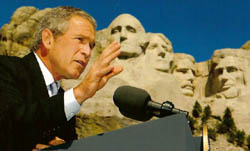| 1 |  | 
A. Pseudo-Events  <a onClick="window.open('/olcweb/cgi/pluginpop.cgi?it=jpg::::/sites/dl/free/0073511935/234798/W11_2.jpg','popWin', 'width=NaN,height=NaN,resizable,scrollbars');" href="#"><img valign="absmiddle" height="16" width="16" border="0" src="/olcweb/styles/shared/linkicons/image.gif"> (17.0K)</a> <a onClick="window.open('/olcweb/cgi/pluginpop.cgi?it=jpg::::/sites/dl/free/0073511935/234798/W11_2.jpg','popWin', 'width=NaN,height=NaN,resizable,scrollbars');" href="#"><img valign="absmiddle" height="16" width="16" border="0" src="/olcweb/styles/shared/linkicons/image.gif"> (17.0K)</a>
Ken Lambert, Associated Press
Presidential Theater
President George W. Bush uses the backdrop of Mount Rushmore National Memorial in South Dakota to assail "obstructionist senators," and to place himself alongside four great presidents. | There are several names given to events that are planned or planted for press coverage. They have been called staged- events, orchestrated-events, media-happenings or media-events and pseudo-events. They have in common the intent of the planner to entice press coverage for the benefit of the planner or the person or group represented.
- Find an example of such an event.
- Assess the way the reporter handled it. Did the reporter simply pass on information from the source, or was there independent reportorial checking and backgrounding?
- One study indicates that in some newspapers as much as 80 percent of the stories originate with sources and are untouched by reporters. That is, reporters serve merely a stenographic function. Can you make an educated guess about the content of your local newspaper? Does it have a reputation for its staff-originated stories, as differentiated from source-originated stories?
|
|
| 2 |  | 
B. New News Rolling Stone magazine says that the "Old News is pooped, confused and broke," and in its place the New News is evolving, "a heady concoction, part Hollywood film and TV, part pop music and pop art, mixed with popular culture and celebrity magazines, tabloid telecasts, cable and home video."
The New News, says the magazine, sets the subjects of conversation and will establish the country's social and political agenda.
In response, the television journalist Bill Moyers says: People want to know what is happening to them, and what they can do about it. Listening to America you realize that millions of Americans are not apathetic. They will respond to a press that stimulates the community without pandering to it, that inspires people to embrace their responsibilities without lecturing or hectoring them, that engages their better natures without sugarcoating ugly realities or patronizing their foibles. In which direction do you think journalism is heading? |

